Power Workshops
Announcing three new Dubai training workshops (Instructor led) in our brand new Power workshop series. Planned dates are last week of July. Three in demand topics. Three days. For Treasury, Finance, Risk, Compliance and Internal Audit team members and audiences interested in decoding and validating option pricing models in Excel, Applied Asset Liability Management practices from the field and the new IFRS 13 guidelines on Credit Value Adjustment . Small class size for maximizing individual learning, attention and impact.

- Pricing FX Options using Monte Carlo Simulation – July 26th
- Advance Asset Liability and Liquidity Management – July 27th
- Treasury Risk – From Pre Settlement Risk (PSR) to Credit Value Adjustment (CVA) – July 28th
For early bird online registration and payment details see Dubai Training Power workshops or the Dubai Treasury Risk Training brochure.
| Date | Workshop | Time | Location |
| 26th July 2016 | Pricing FX derivatives using Monte Carlo Simulations | 8:30 am – 4:00 pm | Dubai |
| 27th July 2016 | Advance Asset Liability and Liquidity Modeling | 8:30 am – 4:00 pm | Dubai |
| 28th July 2016 | Treasury risk – From PSR to CVA | 8:30 am – 4:00 pm | Dubai |
What are Power Workshops?
Power workshops are high intensity workshop for advanced and intermediate users with limited time availability. They pack a day and a half of training content in one day. The well tested pedagogy has been developed over fifteen years by delivering risk, treasury and financial simulation training to banking and treasury customers in the US, Far East and Middle East . The proprietary approach breaks training down into three x two hour sessions. The first two hours set the context and break the domain language and terminology barrier. The next two training sessions focus on hands on model building exercises.
Audience is limited to nine participants per session to ensure that every participant receives individual attention and sufficient time with the trainer. All models built in the class are shared with participants along with reference materials, study guides and online review courses. The curriculum originates directly from our treasury and risk consulting practice where we help customers with valuation opinions and accounting disclosures for both market linked as well as ill-liquid securities.
Power workshops are targeted assume some level of proficiency and comfort with the topics in question and generally begin at a higher level than our traditional offerings. They serve as short, high speed crash courses in model building, validation and applications for audiences that need a deeper, practical understanding of the subject.
If you have questions about eligibility and background please drop us a note. We will be happy to answer any queries.
Training Testimonials
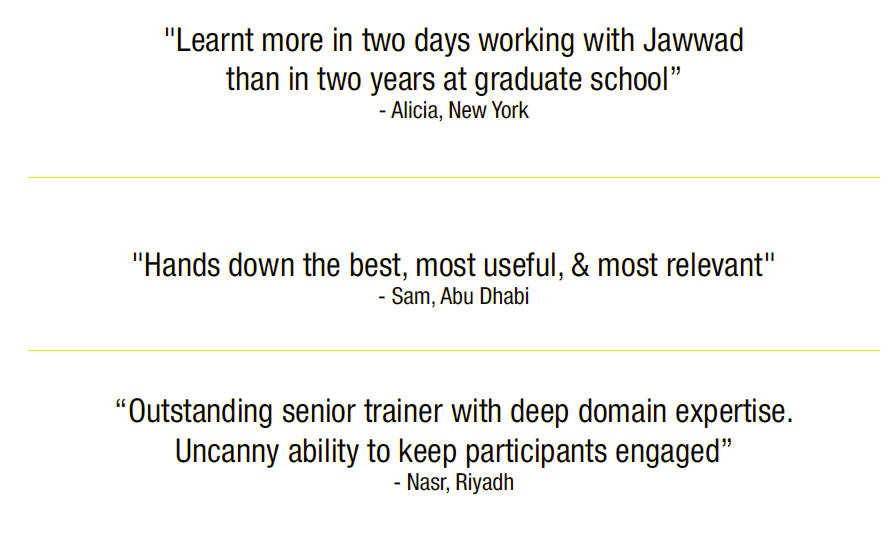
A – Pricing FX Options using Monte Carlo Simulations
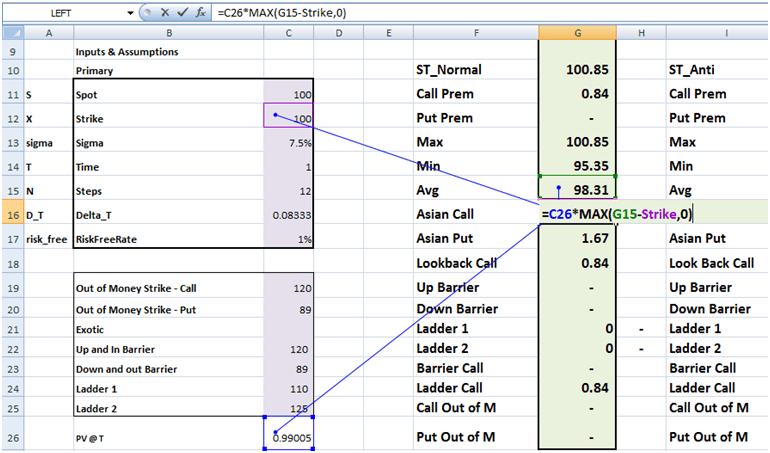
Can you quickly validate a term sheet or audit assumptions using desktop models on a local spread sheet. If you deal with derivative products, validating option pricing results is always a challenge.
Our hands on modeling course begins with building simulators for foreign exchange rates and commodities using Monte Carlo simulation. Starting off with the simplest of derivative contracts we move on to pricing exotic products such as binaries, sudden death and double touch options. We add participating forwards, Asians and more complex structures common to the Middle East to our portfolio. We introduce multiple convergence and market calibration techniques that speed up the pricing process. We close the day by taking a look at building volatility surfaces and exploring ideas for incorporating them in our pricing engine.
Sample content from prior posts on FX Option pricing.
B – Advance Asset Liability and Liquidity management
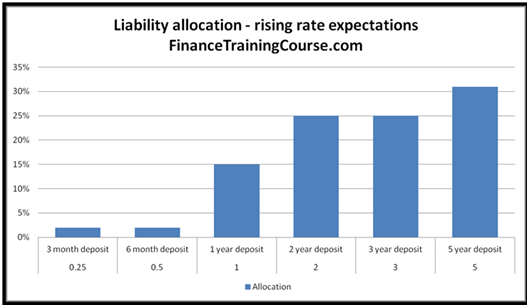
There are two core objectives that need to be addressed within an Asset Liability workshop. Understanding the model building framework and figuring out applications for applicable insights. This custom designed training aims to address both.
The six hour crash course in ALM reviews the classical Board ALM deck by first revisiting the concepts of price, maturity, rate and liquidity gap. We follow through by digging deeper into Net Interest Income at Risk, Market Value of Equity (MVE and EVE), Earnings at Risk and Market Value at Risk reports. Basel III measures for LCR and NSFR are investigated and incorporated in the original framework.
We close the day with a real time case study where we examine the impact of our decisions on core ALM and Liquidity drivers – balancing the impact of changing interest rate outlook on earnings, liquidity, shareholder value and credit default exposures.
Sample content from prior ALM Courses.
C – Treasury Risk. From PSR to Credit Value Adjustment
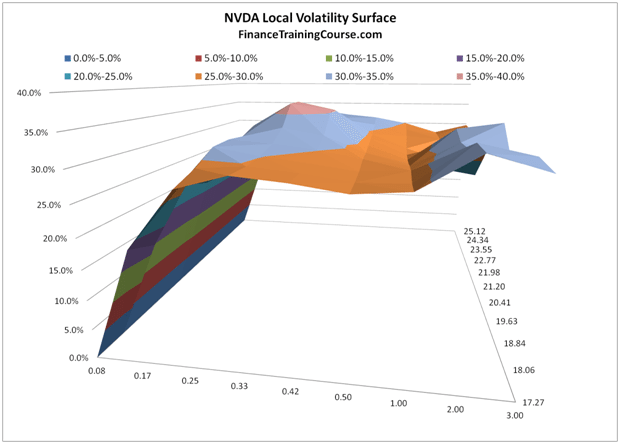
Working with Pre settlement Risk and Potential Future Exposure was difficult, we now need to get comfortable with credit and debit value adjustments. An intense one day review of position risk limits and counterparty credit risk (CCR).
This course builds up on the foundation set in the pricing FX options using Monte Carlo simulation course which is also a pre-requisite for the CVA course. We examine the link between risk metrics and position risk limits including drivers that control risk exposure. Beginning with a simple value at risk model we jump to pre-settlement risk exposure (PSRE) and potential future exposure (PFE). The next step is fair value models for credit value adjustment and debit value adjustment under IFRS 13.
The risk metrics models are extended to multiple asset classes including FX, bonds, equities, commodities and common derivatives contracts such as promise (forward) and profit rate swaps (interest rate swaps). A case study for calculating CVA for forward contracts and interest rate swaps is used to build, decode and dissect a product specific CVA model.
Logistics
- Location: Dubai, UAE. Date: 26th, 27th and 28th July 2016.
- Format: Live, interactive, Instructor led.
- Session break down
- 08:30 – 08:45 – Registration
- 08:45 – 10:45 – Session one
- 10:45 – 11:00 – Tea break
- 11:00 – 13:00 – Session two
- 13:00 – 14:00 – Lunch and prayer break
- 14:00 – 16:00 – Session three
Registration cut off – 20th July 2016. To avoid disappointment please ensure that your payment is received before 22th July 2016. Early bird discounts and registrations expire 17th July 2016.
Because of limited seats registration is first come first served basis. Please note that each workshop can only accommodate maximum of 9 participants. Laptops with a functional version of Excel Professional are required.
Workshop Pricing
| Date | Workshop | Early bird pricing/Regular pricing | Discounts |
| 26th July 2016 | Pricing FX derivatives using Monte Carlo Simulations in Excel | US$ 830 / US$ 950 | 10% off multiple delegates |
| 27th July 2016 | Advance Asset Liability and Liquidity Modeling | US$ 830 / US$ 950 | 10% off multiple delegates |
| 28th July 2016 | Treasury risk – From PSR to CVA | US$ 950 / US$ 1050 | 10% off multiple delegates |
Contact
For additional information, please reach out to:
Jawwad Farid or Uzma Salahuddin at:
Alchemy Technologies (Pvt.) Ltd. / FinanceTrainingCourse.com
- 166 Block 7/8, KMCHS, Karachi, Pakistan.
- Phone: +9221 3 455 64 52
- Email: [email protected], [email protected]
- Web: Finance Training Course.com
Who is the Trainer?
Jawwad Ahmed Farid
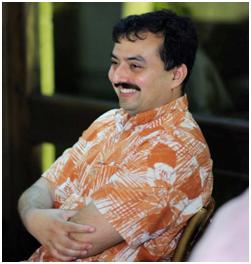
Jawwad Farid has been building, implementing risk models and back office systems since 1993. Working with clients on four continents he helps bankers, board members and regulators take a market relevant approach to risk management.
Jawwad is a Fellow Society of Actuaries, (FSA), holds an MBA from Columbia Business School and is a computer science graduate from FAST NUCES. During the last twenty four years, he has worked as an advisor and a consultant in North America, Pakistan, Middle East, Africa, Far East and the United Kingdom. His previous employers and clients include Goldman Sachs, Andersen Worldwide, Merrill Lynch, Asian Development Bank, Pacific Life, State Life Insurance, Adamjee Insurance, Riyadh Bank, May Bank, Dubai Islamic Bank, Mashreq Bank, First Gulf Bank, Wealth Management Services and InvestBank.
Jawwad’s expertise include investment management, product development and risk models. He has advised multiple due diligence teams on risk assessment and valuation in banking and insurance sectors, set up FX and commodity hedging desks, written treasury and trading platforms, built fair value models for illiquid securities and Level 3 valuations (FAS 157) disclosures, helped life insurance funds on allocation and bid patterns for 10, 20 and 30 year bonds, ALM mismatch and fixed income portfolio strategy.
Jawwad has also worked with the Asian Development Bank, securities and banking industry regulators on assessing the state of the corporate bond markets, issued valuation opinions on cross currency swaps, interest rate swaps, caps, floors, participating forwards and contingent liabilities for Exchange Guarantee Funds in the region.
He is the author of Option Greeks Primer and Models at Work, both published by Palgrave Macmillan. As an adjunct faculty member at the SP Jain Global School of Management in Dubai and Singapore he teaches the Risk Management and Derivative Pricing course. Jawwad is a Director at Sunoida Insights Pte. Limited, a risk technology, solutions and consulting practice, part of Sunoida Group, based out of Singapore as well as the founder at Alchemy Technologies and FinanceTrainingCourse.com.


